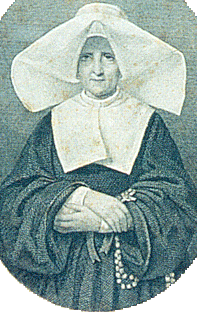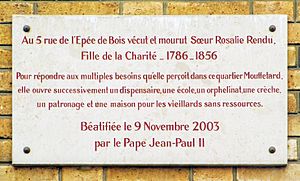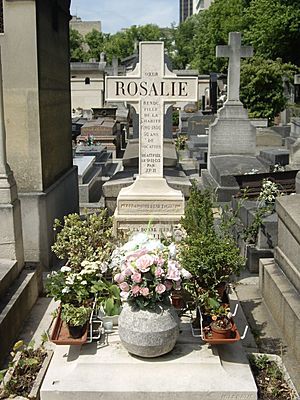Rosalie Rendu facts for kids
Quick facts for kids BlessedRosalie Rendu D.C. |
|
|---|---|
 |
|
| Born | 9 September 1786 Confort, Ain, Kingdom of France |
| Died | 7 February 1856 (aged 69) Paris, France |
| Venerated in | Catholic Church |
| Beatified | 9 November 2003, St. Peter's Basilica by Pope John Paul II |
| Feast | 7 February |
Rosalie Rendu (born September 9, 1786 – died February 7, 1856) was a Daughter of Charity. She was a key person in helping the poor in Paris during the 1800s. At that time, many people moved to cities because of the Industrial Revolution, which led to a lot of poverty.
The Catholic Church recognized her for her holy life. She was beatified, which means she was declared "Blessed." Her special day is February 7.
Contents
Early Life and Family
Rosalie Rendu was born as Jeanne-Marie Rendu on September 9, 1786, in Confort, France. This town was not far from Geneva. She was the oldest of four girls. Her family owned land and was well-respected in their area.
She was baptized on the day she was born. Her godfather was Jacques Emery, a family friend who later became a leader in the Society of Saint-Sulpice in Paris.
Growing Up During the French Revolution
Jeanne-Marie was three years old when the French Revolution began. During this time, priests were forced to take an oath to support the government. Many priests refused and had to hide or flee.
Her family's home became a safe place for these priests. Some even escaped to Switzerland from there. The Bishop of Annecy, a high-ranking church leader, hid in their home using a different name. Jeanne-Marie was very curious about this "hired hand" who was treated so well. One night, she discovered he was secretly celebrating a Mass.
She grew up in this environment of strong faith, even though it was dangerous. She received her First Communion one night by candlelight in her home's basement. These experiences helped shape her strong character.
Family Changes and Education
In 1796, her father passed away. A few months later, her youngest sister also died at four months old. These events deeply affected the family. Jeanne-Marie, as the oldest, helped her mother care for her younger sisters.
Her mother sent her to study with the Ursuline Sisters in Gex. Jeanne-Marie stayed there for two years. She was very smart, but her learning was mostly practical. During walks, she saw a hospital where the Daughters of Charity cared for the sick. She felt a strong desire to join them.
Her mother agreed, and Jeanne-Marie, though young, spent some time at the hospital. There, she gained experience in caring for sick people.
Becoming a Daughter of Charity
Jeanne-Marie decided to join the Daughters of Charity. On May 25, 1802, she arrived at their main house in Paris. She was almost 17 years old. The training program for new sisters had just reopened after being stopped by the Revolution.
When she joined the community, she was given the name Rosalie.
Serving in a Poor District
As a young sister, Rosalie was not very strong. The quiet life of a new sister and lack of exercise made her health weaker. Her doctor and godfather suggested she move to a different house of the Daughters of Charity.
She was sent to the Mouffetard District in Paris, a very poor area. She stayed there for 54 years. This part of the city had many people suffering from poverty. The houses were old and damp, and the streets were dirty.
Sister Rosalie learned by helping other sisters visit the sick and poor. She also taught reading and catechism (religious lessons) to young girls at a free school. In 1807, Sister Rosalie made her first vows to serve God and the poor.
Sister Servant and Community Leader
In 1815, Sister Rosalie became the Sister Servant, which means she was the local leader of her community. Two years later, her community moved to a new building for more space. During these difficult times, more and more poor people needed help.
She worked with the government's welfare department. She helped give out vouchers for coal and food. She sent her sisters into all parts of the St. Médard Parish to deliver supplies, clothes, care, and kind words.
Showing Respect to the Poor
Sister Rosalie treated the poor with great respect. She believed that how you help someone is as important as the help itself. She often said, "One of the greatest ways of doing good to the poor is to show them respect and consideration."
She found strength in the words of Vincent de Paul, who founded the Daughters of Charity. He said, "You will go and visit the poor ten times a day, and ten times a day you will find God there." Sister Rosalie lived as if God was always with her.
She made sure her sisters had time for prayer. But she also taught that sometimes you need to "leave God for God," meaning to stop praying to help someone in need. She would pray while walking through the streets, talking to God about the families and elderly people she met. She said, "Never have I prayed so well as in the streets."
Helping Others Grow
Leaders sent new sisters and those who were struggling to Sister Rosalie's house for training. She once gave this advice to a sister who was having a hard time: "If you want someone to love you, you must be the first to love; and if you have nothing to give, give yourself."
As more sisters joined, their charity office grew. It became a house of charity with a clinic and a school. She saw this growth as a sign of God's plan.
During times of unrest in 1830, church leaders found shelter at her house.
Expanding Services for the Needy
To help all who suffered, Sister Rosalie opened many services. These included a free clinic, a pharmacy, a school, and a center for mothers and children. She also started a club for young workers and a home for elderly people with no money.
For young girls and mothers, she organized classes in sewing and embroidery. Soon, a large network of charitable services was created to fight poverty.
Sister Rosalie believed that the poor were like "our lords and masters." She taught her sisters to be dignified even if the poor were rude. She said, "Remember, Our Lord hides behind those rags." Her companions noted that she corrected them kindly and had a gift for comforting people.
Wide-Reaching Influence
Sister Rosalie's reputation quickly spread throughout Paris and beyond. She was good at gathering many helpful and dedicated people to work with her. Rich people found it hard to say no to her requests for donations. Even former royalty gave generously.
Many important people visited her, including bishops, priests, ambassadors, generals, and even Emperor Napoleon III and his wife.
Students from law, medicine, and other important schools came to Sister Rosalie for advice. They asked her where they could help those in need. She became the center of a big charity movement in Paris during the early 1800s. She guided these young people, telling them which families needed help. She also helped them think about their experiences among the poor.
Her cousin, Eugene Rendu, said she had "common sense, pushed to the point of genius." In 1833, she began guiding the first members of the Society of Saint Vincent de Paul. Frédéric Ozanam, who founded this society, often came to her for advice.
In 1840, she helped restart the Ladies of Charity, who visited homes to help. In 1851, she took over running an orphanage. She also helped priests and religious people who were struggling with mental health challenges.
Facing Hardships and Unrest
The Mouffetard District faced many difficulties. Sicknesses like cholera spread easily because of poor hygiene and poverty. In 1832 and 1846, Sister Rosalie and her sisters showed incredible dedication. They cared for the sick, stayed with the dying, and buried the dead.
In February 1848, there was fighting in the streets between workers and powerful groups. The Archbishop of Paris was killed trying to stop the fighting. Sister Rosalie was very sad about this. She bravely climbed over the barricades to help wounded fighters, no matter which side they were on. She risked her life without fear, and everyone admired her courage.
When peace returned, Sister Rosalie tried to save people she knew who were being punished. The mayor of the district, Dr. Ulysse Trélat, helped her a lot.
In 1852, Napoleon III wanted to give her the Grand Cross of the Legion of Honor, a very important award. She wanted to refuse it, but her superior told her to accept it.
Death and Legacy
Sister Rosalie was always in fragile health. She never rested, always pushing through tiredness and fevers. However, her age and increasing sickness eventually weakened her. In her last two years, she slowly became blind. She died on February 7, 1856, after a short but serious illness.
Many people in Paris were deeply saddened by her death. After her funeral at St. Médard Church, a large crowd followed her coffin to the Montparnasse Cemetery. They came to show their respect for all she had done and their love for this amazing sister.
Newspapers from all over wrote about the admiration and respect people had for Sister Rosalie.
L'Univers, a major Catholic newspaper, wrote on February 8: "Our readers understand the sadness that has come upon the poor of Paris. They join their sufferings with the tears and prayers of the unfortunate."
Le Constitutionnel, a newspaper that was often against the church, also announced her death: "The unfortunate people of the 12th district have just experienced a regrettable loss. Sr. Rosalie, Superior of the Community... died yesterday... For many years this respectable woman was the salvation of the numerous needy in this district."
The official newspaper of the Empire, le Moniteur Universel, praised her kind actions: "Funeral honors were given to Sr. Rosalie with unusual splendor. For more than fifty years this holy woman was a friend to others in a district where there are many unfortunate people to care for and all these grateful people accompanied her remains to the church and to the cemetery."
Many visitors came to her grave to pray. At first, it was hard to find her grave because Daughters of Charity were buried in a common area. So, her body was moved to a spot closer to the cemetery entrance. On her simple tomb, it says: "To Sister Rosalie, from her grateful friends, the rich and the poor." People still place flowers there today.
She was beatified by Pope John Paul II on November 9, 2003.
 | Precious Adams |
 | Lauren Anderson |
 | Janet Collins |



